By Cynthia L. Fonta, Final year Doctorate candidate, School for Policy Studies
Volunteering and outreach activities
I volunteered in a research institution in a community in Burkina Faso prior to joining the School for Policy Studies as a postgraduate research student. It was a lonely four hours’ drive to that community from the city. The roads were terribly dusty during the dry season and flooded in the wet seasons. We had to pass several flooded bridges in the wet season – a risky crossing. Just getting there was a nightmare but then, you tend to forget all agitations and worries once you have arrived. It was a natural and untouched environment with clean air and wonderful people. I fell in love with the villagers with their friendly and generous nature.
What struck me the most was how forgotten they were by the development plans and projects. I could see in their eyes the unspoken truth of suffering and poverty. Water was not clean; sanitation was in the bushes and no households who could afford even unimproved pit toilets. I thought to myself, how can something as basic as this be a luxury? How can there be campaigns to increase Vitamin A uptake, mass deworming programs, hand washing sensitisation campaigns without the most basic key to life, clean water services? These are all good strategies, but in my opinion, they must be integrated with the most important needs of the community.
I suddenly had the urge and motivation to go back to school to enhance my research skills and influence policy. I had no financial means to help, I had no voice to speak and the only way I could have a voice was through research. So, my journey to Bristol began. I met my current supervisor, Professor Gordon, whose work had so much inspired me to understand child poverty and how it was measured. The rest was history. The very idea that I realised my dreams to study policy in health-related research is itself a blessing I never take for granted. My stipends from the University of Bristol studentship helped me adjust to student life and take care of my cost-of living expenses. A small part of it was saved every month because I promised myself to do something someday to help an impoverished community.
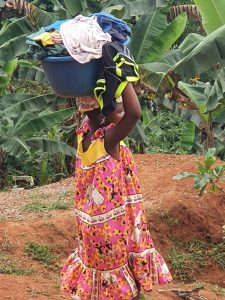
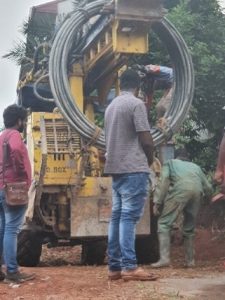
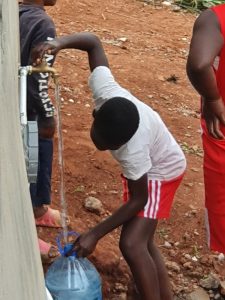
I went back home for the summer break to be with my kids while working remotely from home, Yaounde, Cameroon. It was my first time living in that community in Yaounde. Early on, I noticed children walking down the hill with buckets to fetch water. Their ages ranged from as small as four years to adults. I decided to drill a bore hole for the community with some funds put aside from my stipend. Notice the little boy fetching water into the container for drinking in the photo on the right-hand side above? The water has been tested and it is odourless, colourless, free of chemicals and microbes. I thank the University of Bristol and the Bristol Poverty Institute for granting such an opportunity to make a difference in this small way.

I also had the opportunity to meet a lovely group of persons with special needs at the Centre des Handicapés (special needs centre) at Etoug-Ebe in Yaounde Cameroon during same period. This meeting took place during a three-day symposium organised by the deputy director of the Centre (centred with the white face cap in the photo below), Mr Douglas Achingale. I was invited by one of the guest speakers.
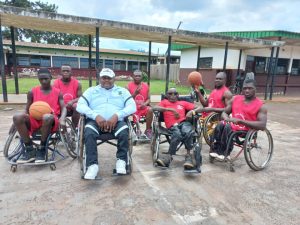
The participants came from all provinces across the country to discuss their challenges and difficulties of navigating their limitations in such resource poor settings. They were educated about their rights as included in the United Nations Convention of the Rights of Persons with Disabilities (UN CRPD), followed by a series of entertainment activities.
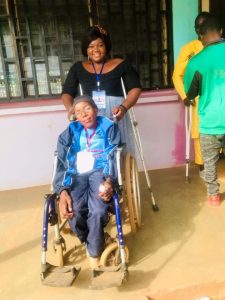
The director owns an NGO Sports on Wheels Association whose main purpose is to promote sporting activities among people with special needs. They are known throughout the country for organising country wide basketball tournaments, table tennis tournaments, weightlifting and other indoor activities for persons with special needs to uplift their spirits and keep them healthy. It was really impressive.
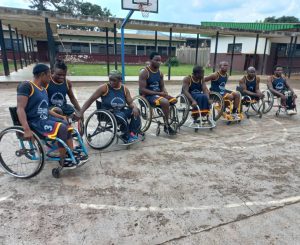
My research and future interests
My research focuses on child poverty and deprivation in decent living standard (clean water, adequate sanitation, access to health and adequate diet, quality housing, access to education and information) across African states and the implications of poverty on child mental health states. Child poverty is examined in the context of postcolonial economic and administrative dependency structures linked to persistent unequal distribution of poverty and under-development in the continent. African states are categorised into two groups, Anglophone Africa, governed under indirect ruling structures set up by English colonists, and Francophone African states which ruled under centralised or direct ruling polices set up by French colonists. The overall aim of the study is to determine which group produced worse child poverty outcomes and inequality distribution to direct policy priorities. Here, large secondary data from varied sources are harmonized over different survey years to produce robust poverty and inequality estimates.
The School for Policy Studies and my supervisors, Professor David Gordon and Dr Zoi Toumpakari, have guided my epistemic way of thinking to critically theorise, conceptualise and hypothesise innovations and ideas to provide the best evidence for policy. They exposed me to managing large data sets, multidimensional poverty estimations, inequality calculations and multilevel regression analysis. I intend to carry on with these skills by conducting research in vulnerable groups anywhere in the world. I have done some work on elderly wellbeing, currently doing some work on children in poverty and hopefully in the future, work with persons with special needs or maternal wellbeing. I intend to use these skills to shine a light on impoverished and vulnerable groups in the society through community research and implementation activities.
Advice to policy students
My advice to policy students is to follow their passion, be innovative in thinking and remain in constant touch with supervisors who will guide and harness your thoughts, innovations, and productivity. Present your work in conferences and research groups to gain feedback for improvements. Volunteer as much in research institutions or programs because it opens one’s mind to relevant problems and areas on which to focus. Take advantage of every conference or program you attend to grow your research network and request to volunteer in any program that might be of your interest. Your supervisors are your guide to this lonely and challenging path to obtaining a PhD. It gets challenging as the workload increases over the years, but it takes dedication, commitment and focus to keep going, following the directions of your supervisors every step of the way.
Volunteering and outreach institutional contacts
Institut de Recherche en Sciences de la Santé, Ouagadougou, Burkina Faso.
Contact- Jean-Noël Poda (podajnl@yahoo.fr)
Centre National de Réhabilitation des Personnes Handicapées, Yaoundé, Cameroon
Contact- Mr Douglas Achingale (havocslord@yahoo.co.uk)
